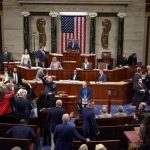Local elections explained: a clique elects its own, the public think about ramifications for Westminster
Without having to make a tedious study of the material, we can probably assume that last week’s local elections results were a source of agitation for lots of people on the internet – because that’s the whole point. We take it for read that, in the intervening days, there must have been reams of column space given over to the topic in corporate-media: it has a job to do. Following closely will be the know-all-know-nothings of the pre-911 attitude political blogosphere, huffing and puffing from whichever direction on the spectrum they are firmly embedded in. Slightly more interesting will be the corporate-media auxiliaries (that is, alternative media that supports the Establishment paradigm), and the purveyors of that common brand of alternative-media-proper that won’t let go of the left/right concept for dedication to the promised Second Coming of Corbyn. A good result for Labour has been understated by “Tory media”, including the BBC, apparently, in an attempt to quash the anti-Establishment renegade, Jeremy; this is the general idea of the stuff that the author has seen.
Anyone reacting in this way is responding exactly as they are supposed to. Local elections are framed as some kind of statement about broader national politics – the British Government has been doing it for years. Shaping public perception about local elections is about engineering expectations, and influencing the way people vote in the national versions. It is no less useful in these regards than opinion polls. Let’s examine a couple of examples. The first is a blatantly obvious, the second is much more subtle, but it all amounts to the same thing.
Prime Minister Theresa May brilliantly shut Jeremy Corbyn down as she reminded the Labour leader of the disappointing results his party received in last week’s local elections.
(Source).
The people have spoken. But councillors and staff now have to puzzle out exactly what they said about local services and policies. Could it be that they didn’t say much at all?
Deliberately or not voters endorsed the old Labour-Tory dualism in England’s local government. If the elections marked the end of Ukip as a presence, few will notice, the party having made little or no impact on policy or service delivery.
(Source).
Not so long ago, it would have been said in these pages that folks would have had to vote UKIP in every and any election, no matter how innocuous, to damage Establishment perception shaping efforts. Now, the spoiling that one needs to partake in is to bring about a divorce of local politics from national ones entirely so that mountains can no longer be made out of molehills by those looking to manipulate a particularly easy-to-mould electorate. A method by which to do it appears to have emerged (or at least, become more prominent) in this local election season: it is the local political party. In Bolton (or at least within walking distance), there is the Farnworth and Kearsley First party. In Thurrock, one-time UKIP councillors formed the Thurrock independents. If there was anything to get agitated about in the May 2018 local elections, it would be the emergence of these entities.
In January of this year, in the FBEL article, A dose of Gandhi’s Swaraj to cure the British Government, there was a brief allusion to local elections as part of a discussion about what to do to bring the British Government to heel:
It means not supporting a national political party that can be overthrown at the drop of a hat, and it means not voting in national general elections. If people do not vote for the national government, the national government is not legitimate. However, we should still put up local candidature for to represent us locally where we can turn up on a doorstep and demand justice and make a difference.
What this was meant to convey is the idea that local politicians can be local people, and be answerable in a way that no other politician could be by dint of living amongst those who suffer or prosper by a council’s actions; in this respect there would be good reason to continue to participate in local politics, but it was also hinted at that a reliance on the Establishment parties to select candidates could no longer be tolerated. It’s this point that appears all too prescient in the new light of the “local party”, and requires exploration. Basically, the idea is this: if local parties can get into local office, and provide opposition against the State, then it would definitely be something to pursue. It remains to be seen what can be done; at the moment, with the normalcy bias in the UK as it is, there is a danger that all local political parties can boil down to is “save our NHS” politics – i.e. opposing central government decision making within the parameters that need to be challenged, but which won’t be.
And then, there is the thorny issue of artificial or faux representation and the same dynamic in elections that defines local government exactly the same way it does at a national level: the fact that a majority never votes for the party in office. It could be argued that any “minority” local party in office is different in that it constitutes people taking control of government where they live. The right of this sort of minority to take measures to defend themselves is argued in another FBEL article, English Civil War, American Revolution, Catalonian Independence, Brexit. The idea expressed in that piece is that the right to self-defence can translate to a right to force a solution that impinges on a majority. Local voters who elect a LibLabCon candidate and facilitate the central power of Government, by definition provoke the necessity for acts of self-defence by people who otherwise would suffer.
The electing of LibLabCon councillors not only produces the continuation of detrimental British Government power at local level, but it’s also maintains the mechanics that influence the way people behave in elections to decide a national government. The British Establishment, as big and powerful as it is, surely cannot physically cheat at every count in the country in the same way it did at Thanet in 2015 – there has to be genuine voting stimulated by psychological manipulation, and indeed, this is exactly how modern British Democracy has been instituted to work. Local elections, in this model, are all part and parcel of an effort to manoeuvre public attitudes and influence actions at general election time.
To understand this a bit better, we are going to look at the Thurrock local council election result, because this seat has some recent interesting history. This is the seat that, according to FBEL’s preliminary investigation, UKIP’s Tim Aker should have won in 2015. The scenario was rather like that in Thanet South, where UKIP won the lion’s share of the vote in the council election, but didn’t win the Westminster seat. The party got 21,735 votes (turnout nearly 60,000) in the councils (35.8% – nearly identical to the percentage share at Thanet South), but in the general election, only 15,718, or 31.7% (turnout 49 and a half thousand – the council elections afford an opportunity for people to vote for more than one candidate). Aker came third after the Tory winner, Jackie Doyle-Price, and the Labour party candidate.
It is imperative for the British Establishment that the outsider, looking to surmount the edifice of power, doesn’t even get a foothold, because if he ever did, then the entire structure to be climbed would come crumbling down. In 2015, the Government had no other option but to deal with UKIP in a number of seats by cheating. Thereafter there were a number of psychological operations that damaged the apparent standing of the party. So, by 2017, the Thurrock Westminster seat had returned, according to the Establishment’s perception shaping efforts, very much to status quo politics. It was a target for Labour, with the Tories clinging on. UKIP were not in the picture. Consider the following from the BBC, written after election day:
Labour has failed to take the one seat in Essex it was tipped to have had a chance of winning.
Conservative Jackie Doyle-Price kept her Thurrock seat with a majority of just 345 over Labour’s John Kent.
Mrs Doyle-Price said: “I didn’t expect to win tonight. I will continue to serve the people of Thurrock to the best of my ability.”
So when we look at the recent electoral history of Thurrock, we see a prime example of the Establishment trying to deal with the outsider that has threatened the usual carve-up. Thurrock also serves as a prime example of the way that the 2018 local election was made to form an arena in which the national Labour versus Tory contest could be played out. It has to be said that the Thurrock Independents still retain a lot of seats on the council, but a situation is clearly being reasserted whereby the division between Labour and the Tories becomes the defining dynamic of the council elections as far as the public is required to perceive them. Thurrock isn’t mentioned by name in the following extract from a BBC piece about “Tory targets” on May 3rd, but the theme about a “retreating UKIP” applies to it as equally as it does to the places that do feature:
At the general election last year, a collapsing UKIP vote didn’t translate in to an across-the-board boost for the Conservatives.
So areas to watch out for include Dudley, the black country council where Labour is the largest party but the second-placed Conservatives are in control with the help of the seven UKIP councillors who hold the balance of power.
Nearly seven out of 10 voters there backed Brexit in the referendum. So this is a good test of whether the Conservatives can sweep up ex-UKIP votes or whether a mixture of local issues and any discontent at how Brexit is being handled by the government can help Labour.
In Basildon and Peterborough the Conservatives seem more confident of benefiting from a UKIP retreat, and gains here could potentially mask overall losses nationally.
Here we can see the perception management very clearly at work. The reader should notice in particular that the readers are told that liking the way the Tories handle Brexit should elicit votes for the party in national office, while discontent with that handling should provoke a vote for Labour. There aren’t any other choices. Notice the insertion of the national issue into the local arena. This isn’t about influencing the way people should vote for their local council, it is about making the public interpret the results of a local vote in a way that is significant on a national scale. Here we see the desired interpretations fed to the public via the BBC. Clearly, this is one end of a very broad psychological operation.
At the other end are the people producing the results: the local election voters, who, after all, may not be voting for local issues in the way we might expect them to be doing. First some background for the Thurrock case that is the focus of this article.
In 2015, UKIP took five council seats from Labour, and one from the Tories. In 2018, the Tories won two of these UKIP/Thurrock Independents’ seats, and Labour took two back. They also won a third directly from the Tories. So, this offers plenty of stuff to talk about if one wanted to interpret the tea leaves in terms of who, out of Labour or the Tories, was getting the upper hand in Thurrock, and how, because the tussle is a key one on a national scale, it having been so close in 2017, it translates to the division at Westminster.
But now look at the reality of the case. The two seats which the Tories took from the Independents were Stanford East and Corringham Town, and Stifford Clays. The turnout was 32.89% and 36.10% – this is quite high, evidently the Tories mobilised the local tennis clubs, because 810 people came out to put Labour in its place in Stanford East and Corringham, and 804 in Stifford Clays. Note, the Thurrock Independents scored 565 in Stanford East and Corringham, with UKIP polling 132, so here certainly wasn’t a case of UKIP votes switching to the Tories (a reuse of the perception shaping device that has been deployed by the Establishment since UKIP began to be a threat, and the same old story that has been used this time to explain the non-occurrence of a sweeping nation-wide Labour victory). But if you want to look at things that way, In the Belhus seat (turnout 26.8%), the Tories actually split the vote allowing Labour to win. The other seat that Labour took off the Independents was Ockendon (turnout 29.77%). In all these seats, the winning candidate had no more than 864 votes, with the majority never climbing above 174. In the seat that Labour won from the Tories, South Chafford (turnout 29.43%), the majority was 38 – Labour polling 685.
The point is, what is grist for the big headlines in perception shaping corporate-media, and in the perfect reactions of its lesser-media auxiliaries, is in fact generated by very small numbers of participants. In Belhus and Ockenden 11% of the electorate voted for the winning candidate; it was, 14% in South Chafford; 12% in Standford East; 16% in Stifford Clays. You can bet the mortgage that the same thing happened up and down the land on May 3rd, 2018. Basically, in local elections, some very effective nationally significant psychological manipulation is created out of some exceedingly small fry. Moreover, let’s consider what the picture we are seeing is telling us when it shows that 800 people can elect a candidate. Surely, this is about people, who have certain vested interests caught up in the implementation of local government policy, electing someone from their own number to continue looking after those interests. Of course, at the core of these “clubs” of people are going to be individuals who realise that local politics has to be done in terms of the Tories versus Labour – and these are presumably the ones with links up into the central parties. Because it would be quite feasible to control rackets in groups that were not affiliated with a national party, but if the relationships are retained, and are overt, then it encourages people to think of local government as having a bearing on national government, and to think in terms of the impact of a local vote on the national political environment. Local government without the Tories or Labour would mean the end of being able to appeal to a political colour to garner support. People would have to consider issues that very directly impact their lives – they might well be induced to vote for a group that would act according to their desires. This, in the gangsterist, kickback-for-council-approval world of the British Establishment, would very definitely not be welcome.


















